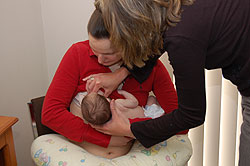Ice or Heat?
When the back, or other area, is injured the rule of thumb is to apply COLD to try to reduce inflammation. Apply a cold pack or ice for 10 minutes, remove for 20 minutes and repeat the treatment until you can reach your chiropractor.
Do not sleep on your stomach
It is preferable to sleep on your side or your back. You can put a pillow under or between your knees to make sure you are well supported. A good pillow that will support your neck is also recommended. Check out our products page to see the pillows we recommend. Stomach sleepers have a tendency to get a lot of headaches and migraines that can disappear when treated by a chiropractor.
Do not cross your legs at the knees
To avoid any undo stress on your low back it is preferable to cross your legs at the ankle.
No wallet in the back pocket
Carrying a wallet in your back pocket creates an unbalanced low back by keeping your rear raised on one side. It’s a better idea to carry your wallet in the front of your jacket or your pants.
Push the snow straight ahead
It is important when shoveling to avoid a twisting motion which causes excessive stress on the low back. It is preferable to push the snow straight ahead.
Bend at the knees when lifting
Remember when you are lifting anything heavy (including your kids) to bend at your knees and lift with your legs. The low back is not designed to lift straight up!
Make sure you are centered at your computer
Your computer screen should be 14 to 16 inches from your eyes and directly in front on you. Support your elbows on the arm rests of the chair or on the desk. Typing with your elbows unsupported creates a lot of stress on the trapezius muscles which often results in neck and shoulder pain.
It seems like baby is always on the breast!
It is normal for a baby to be asking for the breast 8-12 times a day, potentially less often as baby gets older. Babies do not have internal clocks and their feeding patterns should not be dictated by one. Follow baby’s cues by offering the breast when you see signs of hunger such as rooting or the hand to the mouth. Remember that crying is often a late sign of hunger. If you have questions regarding the number of times your baby is nursing contact your lactation consultant.
What goes in must come out!

If you are not sure how much milk your baby is taking, count the number of wet diapers and bowel movements your baby has in a day. By day 6 there should be at least six wet diapers and two or three bowel movements a day. The urine should be clear and not crystallized or pinkish. Contact your lactation consultant if you have questions or concerns.
Sore nipples
When you first experience nipple pain, it is essential to review the latching procedure. A poor latch will almost always cause soreness. If you need help with latching contact your lactation consultant.
Engorgement
In the first few days after birth, when your milk is coming in, it is important to get the milk out of the breast to minimize engorgement. You can apply heat to the breast for five minutes before nursing to help extract the milk and then apply cold for ten minutes at a time as needed to relieve inflammation due to engorgement. Cabbage leaves, applied between feedings, has been shown to reduce engorgement.
Sleep when baby sleeps!!
It is very important for new mothers to sleep when baby is sleeping. It will allow you to recuperate and regain your strength. As much as possible, avoid doing laundry and preparing meals in the first few weeks by asking friends and family to help out.